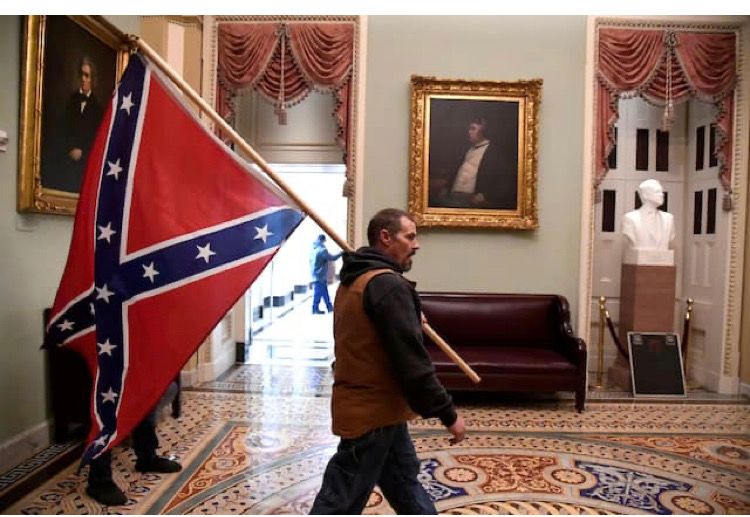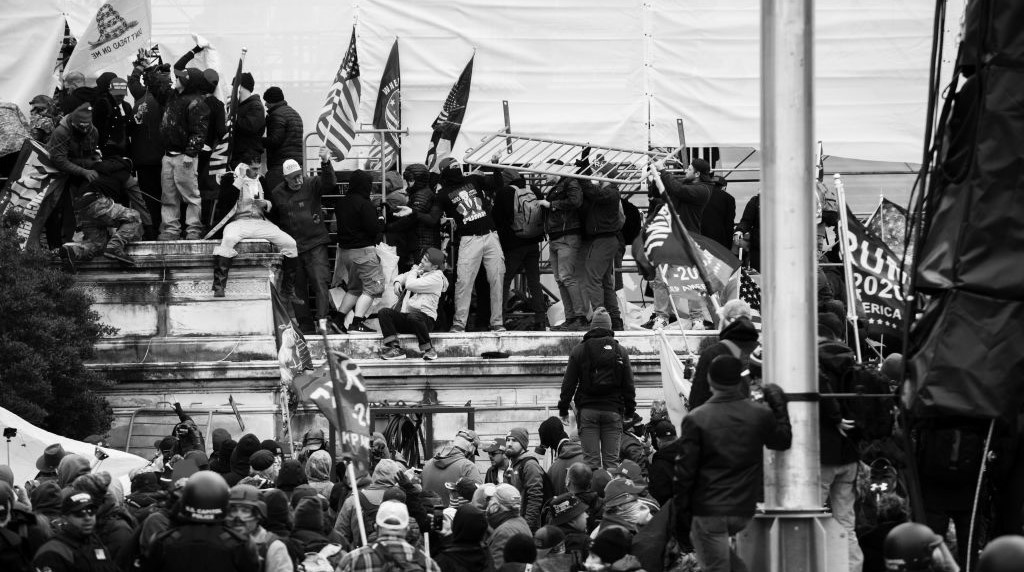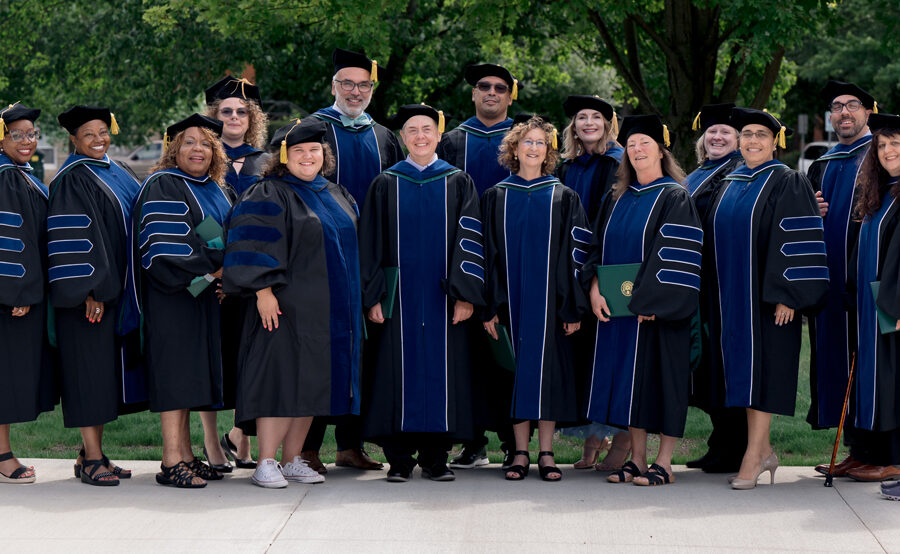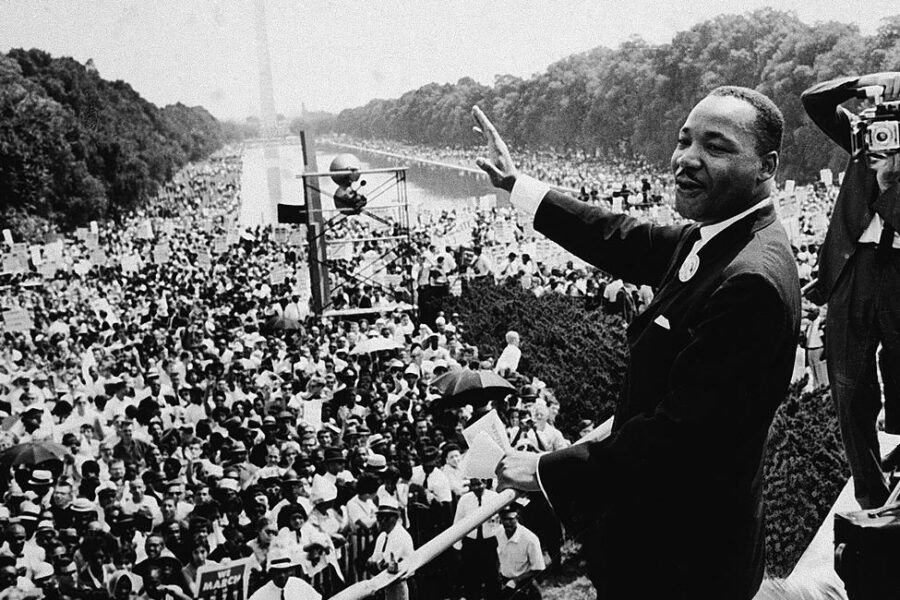Today marks the second anniversary of the attack on the U.S. Capitol. It was an act of sedition, a violent attempt to overthrow the duly elected government, or as federal Judge David Clark put it, “a coup in search of a legal theory.” It was an attempt to block the peaceful transfer of Presidential power for the first time in our nation’s history. And given the continuing attack on American democracy, it is a day that still demands our study and reflection. What have we learned from this event, and how do we better protect democracy going forward?
At the time of the attack, I wrote a similar letter to the Antioch community, remarking on one of the most disturbing images of the day, a photograph of a man parading through the second floor of the Capitol carrying a confederate battle flag, a flag that had never in its history breached the doorsteps of the Capitol. It is an image that sheds light on the true motive of the attack. This was not an attack by “patriots” seeking to prevent what they believed was a “stolen election”; this was a mob of white supremacists seeking to keep in power a defeated President who was sympathetic to their racist and antidemocratic ideology. Believing the Big Lie that the election was stolen was a convenience, and while it was echoed on most right-wing news outlets and online echo chambers, digging deeper for real evidence and facts did not interest them. They believed what they wanted to believe, and as Dr. Martin Luther King Jr. once observed, “nothing in the world is more dangerous than sincere ignorance and conscientious stupidity.”
As of November 2022, 40% of the population and 61% of Republicans still believed the 2020 election was won by Trump. And for those who count themselves among that group, few have bothered to watch the hearings of the January 6 Commission or read the report LOST, NOT STOLEN: The Conservative Case that Trump Lost and Biden Won the 2020 Presidential Election, authored and published in June 2022 by a group of leading conservative federal judges and lawyers.

The man pictured above, Kevin Seefried, and his son, Hunter, were both convicted of felonies including obstructing an official proceeding of Congress. In an interview with the FBI, the younger Seefried stated that he knew his actions were “unAmerican” and that he “knew it was wrong from the bottom of his goddamn heart.” Hunter received a 24-month prison sentence. His father will be sentenced this month.
They are not alone. Over the last year we have seen over 950 citizens either plead guilty to, or be convicted of, various crimes arising from their actions on that day, some of whom received prison sentences of 7 to 10 years. Elmer Stewart Rhodes III, the Yale-educated founder and leader of the Oath Keepers, and Kelly Meggs, the leader of the Florida chapter of that organization, were recently found guilty of seditious conspiracy and are facing prison sentences of up to 20 years. Enrique Tarrio and his subordinates of the Proud Boys are currently on trial for seditious conspiracy in Washington, D.C. Members of the Three Percenters, another right-wing anti-government organization, have also been convicted of seditious conspiracy and obstruction of Congress. Others are still under investigation by the Justice Department. But so far, no one in the Trump administration has been prosecuted for planning or inciting the insurrection.
In its report, the Commission recommends to the Justice Department that it prosecute Donald Trump, and attorneys John Eastman and Jeffrey Clark, “and others” for four, possibly five, felonies including obstruction of the official proceedings of Congress. The report lays out overwhelming evidence that supports the elements of each of those felonies including months of planning by Trump, his lawyers, and other co-conspirators. It is now up to the Justice Department and the recently appointed Special Counsel, Jack Smith, to decide which felonies, including seditious conspiracy, it can prove beyond a reasonable doubt, and then, whether to move forward with grand juries and criminal indictments. Given the political implications of criminally prosecuting a former President, the choice is not clear. But, as Congressman Jamie Raskin remarked during the final hearing of the January 6 Commission, “Ours cannot be a justice system where foot soldiers go to jail and the masterminds and ringleaders get a free pass.” Accountability for those in power, for those who planned the coup, is essential to preserve democracy. If there is no reckoning, no accountability, no prison time, the next despot will be emboldened to try again. The common feature of every successful coup is that the perpetrators had the benefit of seeing the mistakes of prior unsuccessful coups.
In the longer term, we need to address the forces that led to tens of thousands of people traveling to D.C., many with weapons including military rifles, to engage in this insurrection. How is it that over 45% of the population believed that an election was stolen when there hasn’t been a shred of evidence to support that conclusion? In large part, I believe it is a failure of education. As Horace Mann stated, “public education is the cornerstone of our community and our democracy” – without it, we are vulnerable to demagogues and tyrants. This could not be a clearer example of how accurate his statement was.
In the days and weeks following the election, over 70 lawsuits were filed in federal and state courts challenging the election results. In all but one, the cases were dismissed for lack of evidence. Many of those federal judges were Trump appointees. Yet, the courts excoriated the Trump lawyers for abusing the judicial system and bringing meritless lawsuits. One Judge remarked that the complaint and its theories were “stitched together like a Frankenstein monster.” In many cases, the offending lawyers were sanctioned by the Court for their attempts to perpetuate a fraud on the courts. This almost never happens. In other cases, the courts referred the lawyer to the disciplinary counsel of their home states to face possible disbarment for professional misconduct. Rudy Giuliani, who famously remarked that “we have many theories, we just don’t have any evidence,” has had his license suspended in NY and DC. Sydney Powell, Trump’s counsel in the so-called “Kraken Cases” in which she bizarrely claimed that the Dominion voting machines were rigged by Venezuelan President Hugo Chavez who died in 2013, is under investigation for professional misconduct by the state bar of Texas. Virtually all of these 70 election cases were widely reported in the news, and the Courts’ written decisions were readily available online for the public to read. I suspect not one of the participants in the attack on the Capital bothered to read a single decision.
Those facing trial often argued that they believed they were saving democracy from a stolen election, that they were “patriots” and “good people.” I’m sure in many respects that’s true. But as Laurence Tribe, long-time Constitutional law professor at Harvard Law School recently remarked, “one cannot create their own alternative universe of facts, climb into it, get comfy, and then argue that they are innocent because they did not know the real facts. It doesn’t work that way.” Yet, that’s exactly what this mob did.
According to the U.S. Department of Education, 54% of US adults 16-74 years old, about 130 million people, lack proficiency in literacy, reading below the equivalent of a sixth-grade level. About 60% of the population has never read a book in their lives. Given this data, it’s easy to understand how so many Americans could be conned to blindly accept the Big Lie. Garret Miller, who brought a gun to the Capitol on January 6, testified to the January 6 Commission that: “I was in Washington, D.C., on January 6, 2021, because I believed I was following the instructions of former President Trump and he was my president and the commander-in-chief. His statements also had me believing the election was stolen from him.” John Douglas Wright explained that he brought bus-loads of people to Washington, D.C., on January 6 “because [Trump] called me there, and he laid out what is happening in our government.”
At their trials, many of these insurrectionists expressed remorse for their actions, claiming they were duped. One testified that, “Every member—every male member of my family has served in the military, in the Marine Corps, and most have saw (sic) combat. And I cast a shadow and cast embarrassment upon my family name and that legacy.”
Even those who excel in school get very little instruction on civics and the foundational principles of the Constitution and democracy. They have no appreciation for the protections of the free press in society, cannot name the three branches of the U.S. government, and do not know how to recognize a demagogue or authoritarian ruler. Trump knew precisely what the playbook for fascism looks like: demonize the press as “the enemy of the people”; attack the institutions of democracy including the courts, law enforcement, the intelligence community, and the military; instill distrust for facts and knowledge and provide them with “alternative facts”; elevate fear and emotions as legitimate substitutes for facts; destroy the people’s trust in elections; pit citizens against each other, especially marginalized groups; and legitimize violence as a proper form of patriotism when you dislike the outcome of elections.
The vast majority of the insurrectionists erroneously believed that taking up arms against the government was a Second Amendment right. It is not. That’s what we have courts for. The vast majority of them believed that ballot boxes could be “stuffed” with thousands of illegal ballots shipped in from other states, by the truck loads, in suitcases. Stuffing ballot boxes is not a thing. This is not the election of a high school prom queen with construction paper ballots, and a cardboard ballot box. There are systems in place to prevent any ballot from being cast that is not identified to a specific registered voter, and that voter may vote only one time. Once their ballot is cast, their name is checked off as having voted. Most insurrectionists believed that elections are run by bureaucrats with zero oversight from the major political parties. This is not the case. Every county election board has nearly equal numbers of Republican and Democrat representatives. Every precinct has R and D staff and R and D observers who have the right to observe and be present for all aspects of the process. Both parties have eyes and ears on the ground at every step of the process, including early voting through the counting and tabulation of the ballots. Every Secretary of State knows that their primary job is to ensure the integrity of the elections and to certify the outcome as legitimate. For all these reasons, the Election Infrastructure Government Coordinating Committee, after evaluating the election infrastructure in each state, issued an assessment on November 12, 2020, that “The November 3rd election was the most secure in American history.”
Higher education owes democracy more than career preparation for its students. It owes society critical thinkers, engaged citizens, instruction on basic Constitutional principles, and a deep appreciation for the importance of voting and the sanctity of free and fair elections. It is for this reason that I have pushed for an expansion of Antioch’s mission statement to include renewing and preserving democracy as we work toward affiliation with other universities in this new “Justice League” model. I will shortly be asking that our faculty think about how we live that mission and integrate democracy-building into our curriculum at every level and in every degree. As Americans, we can no longer take our experiment in democracy for granted.
In her Forward to the final Report of the January 6 Commission, Vice Chair Liz Cheney remarked that:
The late Charles Krauthammer, political columnist for The Washington Post, wrote, “The lesson of our history is that the task of maintaining strong and sturdy the structures of a constitutional order is unending, the continuing and ceaseless work of every generation.” This task is unending because democracy can be fragile and our institutions do not defend themselves.
I believe that Antioch University is one of those institutions that exists in service to our nation, and specifically to the cultivation of good citizens. If the January 6 attack on the Capitol is the symptom, institutions of higher education, like Antioch and Otterbein, are the cure. We must rededicate ourselves to do all we can to carry on the “ceaseless work” of protecting, preserving, and improving this American democracy for the generations to come. Most important: read. Read original source material like the court decisions. Read newspapers not part of your normal echo chamber. Read the Lost, not Stolen report. Each American should read the powerful Final Report of the January 6 Commission or at least the Executive Summary. It is a civic responsibility. Binge watch the 9 hearings of the Commission if you haven’t already done so. Think critically for yourselves. Learn about the election process. Volunteer to work at a polling location as either an election staff member or an observer. Understand the checks and balances built into the process to ensure election integrity. Work campaigns for those who support democracy. Register to vote and keep that registration current. Volunteer for voter registration drives. Volunteer for get-out-the-vote drives. Volunteer to drive neighbors to the polls. We each have the power to effect change.
So on this anniversary of a day that will surely live in infamy, I hope that you take some heart in the knowledge that your work here at Antioch is part of the cure. This is true whether you are a student deep in your coursework, a faculty member engaged in teaching, a member of Antioch’s staff working to carry our institution forward, or an activist working to change the world for the better. Many of us occupy all of these roles at different times. Behind it all, our work of education is the slow, often quiet, but never silent wheel that over years and centuries bends the moral arc of the universe towards justice, to paraphrase Dr. King.
Sincerely,
Bill Groves, Chancellor




